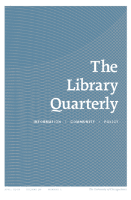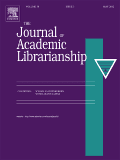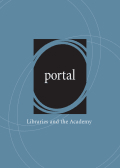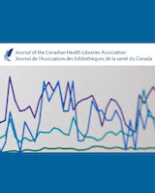
LIBRARY QUARTERLY
Scope & Guideline
Exploring the Future of Library Science
Introduction
Aims and Scopes
- Community Engagement and Civic Responsibility:
The journal highlights the role of libraries as civic centers that promote democracy, social justice, and community engagement. It fosters discussions on how libraries can support civic literacy and empower communities through various initiatives. - Diversity, Equity, and Inclusion:
A core focus is on addressing issues of diversity, equity, and inclusion within library services. The journal publishes research on how libraries can better serve marginalized communities and create inclusive spaces. - Educational Support and Information Literacy:
The journal emphasizes the importance of libraries in supporting education, particularly in fostering information literacy among students and the general public. Research on innovative educational programs and outreach initiatives is a key area of interest. - Digital Transformation and Innovation:
With the rise of digital technologies, the journal addresses the ongoing transformation of library services in the digital age. It explores innovations in library practices, including makerspaces, digital literacy training, and the use of technology in enhancing user experiences. - Health and Well-being:
The Library Quarterly also focuses on the role of libraries in promoting health literacy and well-being. Research on how libraries can address health misinformation and support community health initiatives is increasingly relevant.
Trending and Emerging
- Mental Health and Well-being:
Recent publications have highlighted the role of libraries in supporting mental health initiatives, particularly in response to the stresses of modern life. This trend underscores the importance of libraries as safe spaces for community support and mental health resources. - Civic Engagement and Social Justice:
There is a significant rise in research addressing the civic roles of libraries, emphasizing their potential to foster social justice and community activism. This theme reflects a broader societal movement towards equity and inclusion, positioning libraries as vital players in civic discourse. - Digital Inclusion and Equity:
With the ongoing digital divide, the journal is increasingly focusing on themes related to digital inclusion. Research exploring how libraries can bridge gaps in access to digital resources and services for underserved populations is gaining traction. - Innovative Library Services and Programs:
The emergence of new library services, such as makerspaces, virtual reality experiences, and community co-design initiatives, highlights a shift towards innovative programming that meets the diverse needs of users. This trend showcases libraries as dynamic institutions adapting to the changing landscape. - Information Literacy in the Digital Age:
The emphasis on information literacy has intensified, particularly concerning the challenges posed by misinformation and disinformation in the digital era. Research on effective strategies for teaching information literacy skills is increasingly relevant as society grapples with information overload.
Declining or Waning
- Traditional Cataloging and Classification:
As libraries increasingly adopt digital and user-centered approaches, traditional cataloging and classification methods are receiving less focus. Research that strictly adheres to conventional cataloging practices has diminished in favor of studies exploring more flexible and user-friendly systems. - Physical Library Spaces:
The emphasis on the physical aspects of library spaces has waned, particularly in the context of the COVID-19 pandemic. Instead, there is a growing interest in virtual and hybrid library services, leading to a decline in studies focused solely on the design and function of physical library environments. - Historical Library Practices:
Research centered on historical practices and the traditional roles of libraries may be declining, as contemporary issues such as social justice, digital equity, and community engagement have taken precedence in current publications.
Similar Journals

Bibliotecas-Revista de la Escuela de Bibliotecologia Documentacion e Informacion
Transforming Library Practices through Cutting-edge ResearchBibliotecas-Revista de la Escuela de Bibliotecologia Documentacion e Informacion, published by the Universidad Nacional, Escuela de Bibliotecología, Documentación y Información in Costa Rica, is a vital Open Access journal that has been serving the academic community since 1980. With an E-ISSN of 1659-3286, it focuses on the field of Library and Information Sciences, providing a platform for innovative research, studies, and discussions that contribute to the ongoing development of library practices and information management. Recognized in the 2023 Scopus rankings as part of the Social Sciences category, the journal occupies the Q4 quartile with a ranking of #202 out of 280, reflecting its specialized niche within this rapidly evolving discipline. Over the years, from 2019 to 2024, Bibliotecas has aimed to promote scholarly communication and access to knowledge for researchers, professionals, and students alike, making an important impact in enriching academic discourse and supporting the field’s advancement.

EDUCATION FOR INFORMATION
Empowering Researchers in Library and Information SciencesEDUCATION FOR INFORMATION is an esteemed journal published by IOS PRESS, dedicated to advancing the fields of education, information systems, and library and information sciences. Established in 1983 and continuing through 2024, this scholarly publication provides a platform for innovative research and insightful discussions that cater to the evolving needs of these disciplines. The journal is recognized for its significant contributions to the academic community, holding a Q3 quartile ranking across several categories as of 2023, including Education and Information Systems. Although not an Open Access journal, EDUCATION FOR INFORMATION is indexed in Scopus, boasting a respectable ranking that positions it among the competitive tier of journals in its field. Researchers, practitioners, and students alike will find relevant articles that bridge theoretical foundations with practical applications, addressing contemporary challenges and trends in education and information science. With an international focus and a commitment to enriching the discourse in these vital areas, the journal remains a crucial resource for academia and industry professionals alike.

JOURNAL OF ACADEMIC LIBRARIANSHIP
Advancing Knowledge in Academic Librarianship.JOURNAL OF ACADEMIC LIBRARIANSHIP, published by Elsevier Science Inc, stands as a premier platform for the academic library community, dedicated to advancing research and innovation in library and information sciences. With an impressive impact factor and recognized in the Q1 category for both Education and Library and Information Sciences, this journal is essential for scholars and practitioners seeking to stay abreast of the latest trends and developments in the field. Since its inception in 1988, it has fostered a vibrant dialogue through peer-reviewed articles, case studies, and empirical research, making significant contributions to the understanding of academic librarianship practices and policies. Although not an open-access journal, its robust distribution and visibility through Elsevier's extensive network ensure wide accessibility to its critical insights. With rankings in the 83rd percentile in both Education and Library and Information Sciences, JOURNAL OF ACADEMIC LIBRARIANSHIP continues to shape the future of the profession by engaging a diverse audience of researchers, educators, and students, thereby reinforcing its position as a cornerstone of scholarly communication in the information sector.

CANADIAN JOURNAL OF INFORMATION AND LIBRARY SCIENCE-REVUE CANADIENNE DES SCIENCES DE L INFORMATION ET DE BIBLIOTHECONOMIE
Advancing knowledge in information and library science.Canadian Journal of Information and Library Science - Revue Canadienne des Sciences de l'Information et de Bibliothéconomie is a notable peer-reviewed journal dedicated to the fields of information science and library studies, published by Western Libraries. Since its inception in 1993, this journal has served as a crucial platform for disseminating high-quality research and insights into library practices, information management, and the evolving roles of information professionals. With an impact factor that reflects its standing within the academic community, it currently holds Q4 status in Information Systems and Q3 in Library and Information Sciences for 2023, indicating a growing influence in its fields. Although the journal operates without Open Access options, it remains accessible to those affiliated with institutions that support its research mission. Scholars, practitioners, and students alike are encouraged to engage with the rich content provided in this journal, which sits within the Social Sciences and Computer Science domains, making it an essential resource for advancing scholarly discourse and practical applications in the continuously evolving landscape of information and library science.

INFORMATION TECHNOLOGY AND LIBRARIES
Fostering Innovation in Library Science Through Technology Insights.INFORMATION TECHNOLOGY AND LIBRARIES, published by the American Library Association, stands as a crucial resource in the ever-evolving intersection of information technology and library sciences. With an ISSN of 0730-9295 and an E-ISSN of 2163-5226, this open access journal has been dedicated to fostering the dissemination of innovative research since its inception in 1971. Currently enjoying a Q2 ranking in both Information Systems and Library and Information Sciences, it is well-regarded within the scholarly community, reflecting its commitment to high-quality research outputs. The journal's diversified content scope—and a robust ranking of #80 out of 280 in the Library and Information Sciences category on Scopus—positions it as a pivotal platform for researchers, practitioners, and students alike. With the journals' emphasis on bridging technological advancements and library practices, it remains an essential tool for anyone looking to stay informed and engaged in these dynamic fields.

PORTAL-LIBRARIES AND THE ACADEMY
Transforming Academic Libraries for a New EraPORTAL: Libraries and the Academy is an esteemed academic journal published by Johns Hopkins University Press, focusing on the intersection of library and information science, academic practice, and scholarly communication. With an ISSN of 1531-2542 and an E-ISSN of 1530-7131, this journal offers rigorous peer-reviewed research essential for librarians, researchers, and information professionals committed to enhancing academic libraries and fostering innovative practices in higher education. It holds a strong position in its field, ranking in the 61st percentile within Social Sciences and Library and Information Sciences, and categorized as Q2 in both Development and Library and Information Sciences for 2023. Though the journal is not Open Access, its content is invaluable for anyone interested in staying abreast of the latest trends and challenges in library services and academic environments. Since its inception in 2001, PORTAL has continuously contributed to the discourse on the evolving role of libraries in academia, making it a critical resource for those striving to bridge the gap between information access and higher education pedagogy.

LIBRARY AND INFORMATION SCIENCE
Navigating the future of information sciences together.LIBRARY AND INFORMATION SCIENCE is a specialized academic journal dedicated to the advancement of knowledge and scholarship in the field of library and information sciences. Published by MITA SOC LIBRARY INFORMATION SCIENCE, this esteemed journal has been a crucial platform for scholarly communication since 1980, addressing the dynamic challenges and developments in the information landscape. Although it holds a Q4 category ranking in the Library and Information Sciences according to the 2023 Scopus Ranking, the journal serves a unique niche, providing insights and fostering discussions among a diverse audience of researchers, professionals, and students. With no Open Access options currently available, its valuable research contributions are accessible through institutional subscriptions and library access. The journal aims to disseminate innovative research, case studies, and theoretical explorations that enhance our understanding of information behavior, retrieval systems, library management, and emerging technologies, thus promoting an informed society in an increasingly digital world. Given its focused scope and enduring presence, LIBRARY AND INFORMATION SCIENCE continues to be an essential resource for anyone invested in the future of libraries and information services.

Malaysian Journal of Library & Information Science
Exploring Innovations in Information ManagementMalaysian Journal of Library & Information Science, published by the University of Malaya, Faculty of Computer Science & Information Technology, serves as a crucial platform for researchers, professionals, and students in the field of Library and Information Sciences. With a commitment to advancing scholarly knowledge, this journal has consistently showcased significant research contributions since its inception in 1996, and is currently indexed in Scopus, ranking in the 62nd percentile among its peers. The journal's Q2 categorization reflects its growing impact and relevance in the scholarly community. Although it operates as a traditional subscription-based journal, the publication holds great importance for those looking to delve into innovative practices and emerging trends within library and information sciences. Researchers and practitioners can access valuable insights that contribute to a deeper understanding of the evolving landscape in Malaysia and beyond. Addressed from Kuala Lumpur, Malaysia, the journal welcomes contributions that further exploration and scholarship in the vital field of information dissemination and management.

LIBRARY JOURNAL
Empowering Libraries, Enriching CommunitiesLIBRARY JOURNAL, published by REED BUSINESS INFORMATION, is a vital periodical in the field of Library and Information Sciences, providing a rich resource for researchers, professionals, and students alike. With a history spanning from 1945 to its recent issues, this journal captures the evolving landscape of library science, offering insightful articles that address current trends, practices, and challenges within the profession. Although not an open access journal, LIBRARY JOURNAL is highly regarded for its content, which reflects the challenges faced by libraries and the critical role they play in education and community services. Despite its Scopus ranking of 159 out of 210, the journal continues to contribute significantly to discussions around information management, bibliometrics, and digital libraries, making it an essential read for those invested in the ongoing development of library services and information literacy in the digital age.

Journal of the Canadian Health Libraries Association
Fostering collaboration in the evolving landscape of health libraries.The Journal of the Canadian Health Libraries Association is a pivotal open-access journal dedicated to advancing the field of health librarianship and information sciences. Published by the Canadian Health Libraries Association, this journal has been fostering the dissemination of innovative research and practices since its inception in 2004. With a focus on critical issues in library and information sciences as well as miscellaneous medicine, it has achieved commendable rankings, noted as Q2 in Library and Information Sciences and Q3 in Medicine (miscellaneous) as of 2023. The journal serves as a vital platform for health librarians, researchers, and practitioners in Canada and beyond, providing valuable insights and fostering collaborations in an ever-evolving information landscape. With its address based in Thunder Bay, Ontario, Canada, and an ISSN of 1708-6892, the journal invites contributions that aim to enhance understanding and improve practices within the health information sector, making it an essential resource for anyone engaged in health libraries and information management.